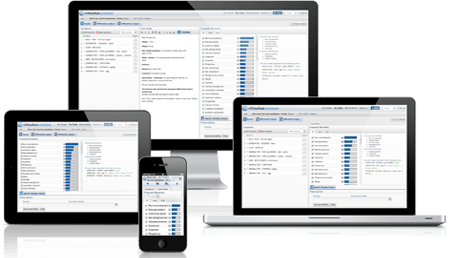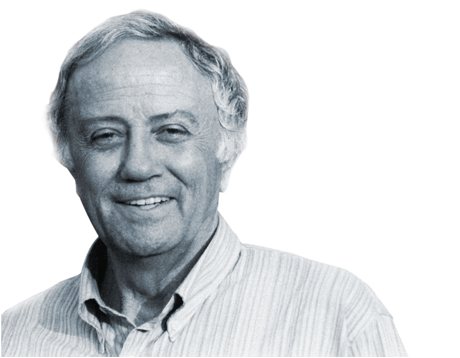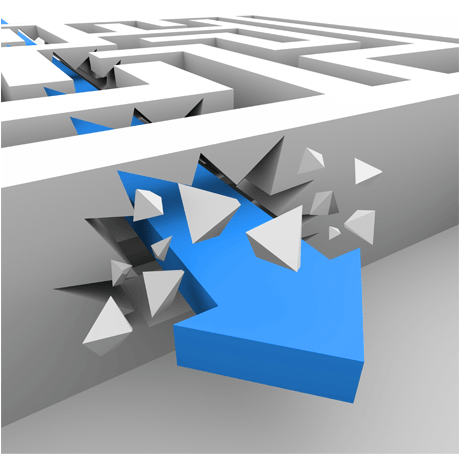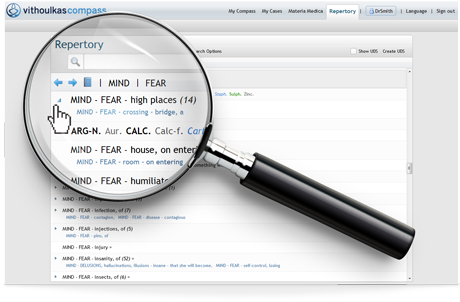About VC
What is VC

VC is a next generation expert system which is designed to effectively support practitioners of classical homeopathy in deciding which remedy to prescribe to their patients. It incorporates several features and tools that make the practice of homeopathy not only easier and more successful but also a constant learning experience. The expert system emulates the thinking process of a master homeopath in many ways.
The analysis of thousands of real cases and guidance by Professor George Vithoulkas have resulted in a performance which is clearly above anything previously available. VC is a web-based application which can be accessed from a variety of web-capable devices, with no need for any software download or installation. It is a live system which will be constantly improved based upon analysis of the results of the users and ongoing research into the complex nature of homeopathy.
Vithoulkas Compass truly represents a new standard in homeopathy software, as the philosophy in every aspect of its continuous development is the maximization of the success rate of homeopaths and a focus on quality and maximum reliability of the repertory data.

VC was conceived in 2004, after the experience by a patient of the impressive curative action of homeopathy but also the realization of the great challenge it represents for the practitioner.
The idea of an online expert system was then proposed to the IACH and Prof. Vithoulkas, and a joint team of homeopaths, mathematicians and computer scientists was formed to research the field, develop an initial framework and then build the first prototypes. The testing of those prototypes confirmed that the fundamental concept of confirmation at all stages with a large number of real world cases was the best way to proceed, producing very consistent results.
The team was then gradually enlarged to enable the advancement of the project in all its fronts, expert system development, repertory development, software platform, networks, etc. In this process a very important factor was the strong dedication of the people who worked in the project from prototype to the complete environment that it presently offers.
In October 2011 the first open beta version of VC was released. Since then the VC team has been constantly adding and upgrading its features and improving its performance and functionality, always committed to the initial vision: to raise the status of homeopathy by rendering homeopathic practice more effective and repeatable. The first big step towards this direction is now here.
An extremely useful tool for all levels of practicing homeopaths. VC will make a difference!
Professor George Vithoulkas

Classical homeopathy is the most time tested and effective form of homeopathy. It is entirely based on the teachings of Dr. Samuel Hahnemann (1755 – 1843), who developed the method after extensive observation and analysis of the reactions of the organism to ingesting substances. Hahnemann was the conceiver of the Law of Similars, the basic premise of homeopathy, which states that a substance will cure the symptoms which it would produce if taken in large doses by a healthy individual. If a patient happens to have the symptomatic picture of a particular substance (which we know after trials on healthy individuals, known as remedy provings), taking the homeopathic form of this substance will produce a healing reaction.
The reaction of a patient's system to a dose of the correct remedy can be spectacular and a true blessing to the patient. Frequently conditions which would seem incurable or irreversible are cleared with the first prescription. It is important to realize that it is not the remedy itself which heals the patient but the reaction, or chain of reactions, of the patient's system which are triggered by the remedy.
The practice of classical homeopathy is based on the careful observation of symptoms combinations, which guide the homeopath in choosing the remedy which will act. The method of classical homeopathy, developed by Hahnemann and his followers over more than 200 years, presents important rules and principles that guide the practitioner towards finding the correct remedy. But in many cases this process is not easy.
The reliable process of remedy selection cannot be instinctive or based on metaphysical theories, meditation, feelings or subjective views.
While the practice of classical homeopathy always requires extensive and accurate gathering of information from the patient, the selection of the correct remedy is relatively straightforward for patients in fundamentally good health. However, when chronic problems have resulted in a more compromised functioning of the various complex controlling and defensive systems of the organism, the identification of the similimum presents a serious challenge to any homeopath. Such patients usually present symptoms or combinations of symptoms that indicate several remedies. The correct choice of remedy can only be achieved by taking into account and weighing accurately a large number of parameters related to the patient's symptoms and their nature and by constantly confirming the candidate remedies by asking the patient relevant questions. This is also where experience and the best available decision support tools are the homeopath's best assets.
In classical homeopathy only one remedy is prescribed at any one time. This has been proven to be clearly advantageous because the reaction of the organism is more concentrated when only one remedy is taken and because the effects of multiple remedies, as a rule, make the discovery of the subsequent remedies much more difficult.
Complex cases ought to be tackled by successive prescriptions, followed by the right intervals of time between them. This approach enables the rebuilding the system step by step, eventually reestablishing a higher level of health for the patient. From the beginning of the therapy there are normally clear signs that the organism is reacting and that healing has started. The duration of the therapy, until the desired state of the patient’s health has been reached, can be from a few months to few years, according the severity and depth of the pathology.
Every homeopath knows that these tasks unsupported can only be performed after years of dedicated study, practice and considerable talent. Historically only homeopaths with more than a decade or so of devoted practice could hope to solve such cases, and even then certainly not every time.
Difficult and complex cases are unfortunately becoming more and more frequent in today's modern societies, and the average homeopath will probably encounter them almost daily. Signs of the deterioration of the general level of health include the growing number of mental, psychological and psychosomatic conditions, as well as the dramatic increase in chronic conditions and degenerative diseases.
Clearly, the most reliable way of remedy selection is to take into account, and weigh accurately, the large number of parameters related to the patient's symptoms and their nature and to attempt to confirm the candidate remedies by asking the patient relevant questions while at the same time consulting the Materia Medica.
Homeopathy is frequently criticized as being totally ineffective, a mere placebo cure. The skepticism of the scientific community towards homeopathy is primarily due to the unknown physics of the action of the remedy. However, it is also true that, at present, the average homeopath is not sufficiently effective to produce reliable results in many complex cases, and that there is also a general shortage of high level practitioners. As a result, not few patients who have consulted a homeopath for a chronic problem have not been helped, or their condition was only partially alleviated.
The challenge that difficult cases present to the practitioner, and the resulting ineffective prescriptions, has catalysed the emergence of alternative theories for homeopathic prescribing, in the hope that they offer the key to an easier and more reassuring selection of the correct remedy. Unfortunately most, if not all, of these theories are not based on sound principles. Provings based on meditation, the theory of signatures, or an essence that, if found, can solve every case, are all examples of methods which tend to rely heavily on subjective judgment and result in very poor success rates. While such methods afford the opportunity for endless theorising, the unfortunate end result is an ineffective practice, and consequently, a bad name for homeopathy as a whole.
Classical homeopathy offers a crystal clear framework of analysis and practice based on real provings, toxicology and careful observation and confirmation of symptoms. Adherence to this approach not only makes homeopathy truly effective, but also makes the practice more teachable. Moving along these lines, the VC team quickly observed that, using advanced algorithms, very good results can be achieved even in complex cases. By studying a large number of cleared cases along with the thinking process of experienced homeopaths and George Vithoulkas himself, the team came to the conclusion that classical homeopathy is a consistent system based on objective parameters, and thus ideal for the application of an algorithmic expert system.

Alternative Nobel Prize, 1996
Professor of the Kiev Medical Academy, 2000
Honorary Professor of Moscow Medical Academy, 2000
Gold Medal of the Hungarian Republic, 2000
Gold Medal as the Homeopath of the Millennium, 2000
Collaborating Professor at the Basque Medical University, 2001-2004
Honorary Professor of the University of the Aegean, 2010
Doctor Honoris Causa of «Dr. Viktor Babes» University of Medicine and Pharmacy of Timisoara, Romania, 2012
Honorary Award of National Medical Academy of Postgraduate Education in Ukraine, 2012
Doctor Honoris Causa at University of Medicine and Pharmacy Iuliu Hatieganu, Cluj-Napoca, 2015
George Vithoulkas is widely recognized around the world as the personality who re-established homeopathy in the second half of the 20th century. During more than fifty years of relentless work, he advanced the theory and practice of homeopathy, trained many of the world’s best known classical homeopaths, wrote important books, helped to develop homeopathic repertories and software for prescribing, and still remains in the forefront of homeopathic thought and education.
In 1996 he was awarded the Right Livelihood Award "Alternative Nobel prize" for his outstanding contribution to the revival of homeopathic knowledge and the training of homeopaths to the highest standards. He is an Honorary Professor of the University of the Aegean in Greece, Hon. Professor of the Kiev Medical Academy, the Moscow Medical Academy, and the Basque Medical University. Since 1994, he has been the Director of the International Academy of Classical Homeopathy in Alonissos, Greece.
His theories on the definition of health, the different levels of health, the role of acute diseases in the progression of health, the psychopathologies of remedies and many others, are not only cornerstones for the practice of classical homeopathy, but also very important as a general approach towards healthcare.
George Vithoulkas has always strived to turn homeopathy into a science, with proper and consistent rules and practice based on well-confirmed, sound and logical principles. He has, since his early years as a homeopath, stressed that classical homeopathy is not an instinctive or spiritual practice, and that his long experience always showed that a homeopath should primarily deepen and refine his skills using the proven method handed by Hahnemann.
Always following these rules, he has practiced classical homeopathy at a level of success and consistency which made him internationally known and respected. He has personally helped countless patients regain their health, and thousands of homeopaths improve their practice. He is still relentlessly working on important areas in homeopathy, improving the repertory, developing and refining the method of practice, and actively participating in the efforts to raise the recognition of homeopathy worldwide.
George Vithoulkas has been teaching since the early 70s. Since 1990, with the establishment of the International Academy of Classical Homeopathy, he has been offering his unique courses to the homeopathic community from the island of Alonissos. His lectures have been recognized in the homeopathic community as being among the most advanced and valuable for the training of successful practitioners. His video courses and, more recently, his e-learning program from the International Academy of Classical Homeopathy, provide education of the highest level in classical homeopathy for the present and future generations of homeopaths.
During the last 4 years, George Vithoulkas has been intensively supporting the development of Vithoulkas Compass, a next-generation expert system which promises to increase the effectiveness of homeopaths of all levels of experience.
This effort started with the study of the archives of the IACH, comprising of close to 100,000 cases, from 40+ years of practice of George Vithoulkas and a team of his students, all of which are medical doctors. The next step was a statistical analysis of approximately 2000 cases with clearly successful outcomes.
The Vithoulkas Compass, team quickly realized that his thinking process and the rules he uses in prescribing, although complex and very detailed, are extremely consistent. The careful study of his method and the application of his thinking process using advanced mathematics have resulted in a new level of accuracy in homeopathic software. Vithoulkas Compass has been conceived to handle the usually overwhelming amount of information and parameters of candidate remedies and symptoms in a case, and provide the homeopath with a clear path for the selection of the correct remedy.
In addition, George Vithoulkas's renowned intimate knowledge of the repertory was instrumental in the development of the VC project, as so achieve confirmed and reliable accuracy, an expert system must incorporate a repertory of analogous qualities.
George Vithoulkas will actively support VithoulkasCompass.com in the future, integrating the results of homeopaths around the world to constantly improve and refine its results and improve the outcomes of even the most difficult of cases.
For more information about George Vithoulkas and the International Academy of Classical Homeopathy (IACH), please visit

Homeopaths have tried, from the very beginnings of homeopathy, to use tools and symptoms' databases to help them in their search for the correct remedy. In the last 30 years, computer programs were developed, with even bigger and better databases, incorporating computational methods for remedy selection. Later, attempts were made, notably by George Vithoulkas himself, to model the thinking process of an expert homeopath. The effect of more advanced software and expert systems on homeopathic practice has been very positive, and with their help homeopathy has managed to establish itself as a powerful healing method.
VC promises to make a difference in the practice of homeopathy because it is based on confirmed findings and important information about remedies, symptoms and methods of successful prescribing, coming from the analysis of thousands of cases, many of which had never been used in previous software. A team of mathematicians and homeopaths, under the guidance of George Vithoulkas, exhaustively analyzed the rules of homeopathic prescribing and the criteria for the selection of a specific remedy. They also studied the workflow patterns of typical prescribing sessions and the questions an expert homeopath asks the patient in the process of determining the correct remedy.
Development of the mathematical core of the expert system started in 2009, after detailed study of the effectiveness of existing homeopathy software. The decision was then taken to design and implement an online software with maximum accuracy and level of decision support for the homeopath as clear priorities, without sacrificing usability and efficiency. The clear goal was drastically increased success rate for users of this system.
The development of VC took more than 3 years of intensive study and application of advanced mathematical models. Extensive use of state-of-the-art mathematical tools, and the development of special supporting software were important steps to ensure that the optimization process was robust and always towards the right direction.
The software team implemented a large number of successive prototypes which were evaluated using statistical data from real cases. These results were reviewed by George Vithoulkas and other experienced homeopaths. The end result is a system which not only proposes the correct remedy for each case with remarkable accuracy, but one which then guides the homeopath through the process of verification of candidate remedies and provides the tools and information for a prescription with confidence.

As presented in the introduction, the remarkable accuracy of the VC 'brain' is the result of a scientifically developed algorithm based on the practice of a master homeopath and confirmed by checking it against large sets of real-world successful homeopathic prescriptions.
The expert system development team used sets of cases from the IACH archives and other experienced homeopaths, with various levels of complexity and maximum dispersion of correct remedies given.
The process of optimization of the 'brain' took more than 3 years of intensive study and the application of advanced mathematical models. Extensive use of state-of-the-art mathematical tools and the development of special supporting software were important steps to ensure that the optimization process was robust and always towards the right direction.
The graphical user interface (GUI) and workflow design of VC have been developed by employing panels of homeopaths of various levels of expertise for usability testing, to ensure that the user experience is straightforward and efficient, within the software requirements for homeopathic prescribing.
The VC expert system guides the homeopath through the process of verification of candidate remedies and offers tools and information to help find the correct remedy even in complex cases. Especially the differential analysis and the extensive search functions (repertory search, synonym search, case relevant keynote search, remedy/keyword search) not only provide unique support to the homeopath in clearing the remedy pictures, but are also designed to drastically cut down the time required to locate possible relevant remedy confirming symptoms.
The important infrastructure and the methods conceived and refined during the building and the testing of VC are being used as a platform for the future. Also new exciting features, many of which come from our beta testers, are being evaluated and tested.
The VC team is constantly collecting confirmed cases from George Vithoulkas, other expert homeopaths and selected successful prescriptions from our users for use in fine tuning and improving the parameters of the mathematical engine. In time it is most probable that this engine will develop to cater more effectively for the most difficult of cases. Already an acute pathologies expert system for VC is in its testing phase and will come online.
The VC expert system is a truly live system which will be moving forward always respecting the vision and preserving the principles that made it a success.

Homeopathic repertories have been developed and used since the early days of homeopathy. They are books that contain the entire list of researched symptoms, organized in a way to help homeopaths find and select the correct “rubrics” - (symptoms which describe the case), along with the remedies which have been effective in treating each symptom. It is obvious that a reliable and accurate repertory is a critical requirement for any homeopathy software to work effectively. Regardless of how advanced its mathematical algorithms, any expert system will produce incorrect results if it is based on an inaccurate repertory.
The homeopathic repertory used by VC is based on Kent's Repertory. Early in the research and development stage, the significant observation was made that using a very large repertory did not improve the chances of finding the correct remedy. In fact, in most cases, a large repertory worsened the potential accuracy of algorithms.
The VC team has delivered an excellent product. The performance of VC has significantly surpassed my expectations
Professor George Vithoulkas
Extensive analysis of real cases using other larger repertories showed that they include a significant amount of inaccurate data and inconsistency, variability in authors' criteria for the construction of rubrics and the remedy weights, to an extent that requires the experienced practitioner to 'read between the lines’, select authors etc. The presence of subjectivity and variability of criteria in a repertory makes the development of a truly effective expert system impossible. Very large repertories are impressive works containing virtually all homeopathic knowledge, but in our experience they are more useful for research. The practitioner seeking maximum success rate needs a repertory with a focus on reliability and consistency rather than on universal coverage and size.
All large, and many of the smaller, remedies have been already sufficiently described by Kent, and the addition of a large number of rubrics from hundreds of authors is bound to increase the risk of misleading rubrics and to blur the remedy 'pictures'. Characteristically, George Vithoulkas states that for 3 decades, using Kent's repertory, he achieved a superb success rate (which made him world famous). His many years of practice and experience, along with the study of the work of other important homeopathic authors, gradually enabled him to subsequently make careful additions and corrections to Kent. His additions and corrections are considered indispensable for correct practice, and result in a repertory which is sufficiently complete for the vast majority of cases.
For the representation of smaller remedies, the experience of George Vithoulkas was equally important. His method of interpreting the rubrics and keynote symptoms of smaller remedies and their combinations has been producing very successful results over decades. The VC team came across several cases where Professor Vithoulkas had successfully prescribed remedies which he had never used before (or which he had prescribed only once or twice in the past). VC had to be developed to be effective in the handling of small remedies, so that no potentially correct remedy can 'escape' from being considered for any specific case.
The VC development team made the decision to build a repertory based on Kent's, with additions and corrections by George Vithoulkas and few other classic authors, always confirming their effect on the performance of the expert system using a large number of confirmed cases.
For the smaller remedies, VC incorporates very careful additions of rubrics and keynotes, based on Boericke, again supplemented with selected rubrics by other authors.
By constantly checking against hundreds of confirmed cases, and using the guidance of George Vithoulkas and a panel of expert homeopaths, the VC repertory will be continuously refined and enriched. Significant input for this process is expected to come from the users of the expert system. The VC team will be researching every possible way of reliably enriching and improving the repertory and is already forming a relevant strategy for the future.

Acute cases are a special part of every homeopathic practice. They can be a serious challenge to homeopaths of any level of experience and they often require both considerable skill and quick decisions. But acute cases may also present an opportunity for the better health of the patient.
VC includes an acute pathology expert system using the methodology of development of the classic prescribing expert system. Its 'brain' has also been based on a large number of real world cases and on very specific parameters which prof. G.Vithoulkas uses to solve an acute pathology case.
This unique module incorporates a confirmed acute pathologies repertory which is structured to assist the user in taking the case. It has been based on classic authors like M. Tyler, J.H. Clarke, W. Boericke, E.A. Farrington and others, with important additions and corrections. The acute pathologies repertory has been intentionally limited in size to maximize consistency and offer the optimum success rate for the great majority of acute cases.
Users can also add rubrics from the general VC repertory, important remedy keynotes or more particular symptoms.
Like all VC components, the VCAcute expert system will be constantly updated and benchmarked against real world data.










